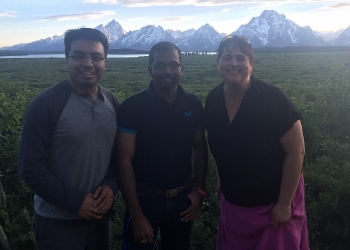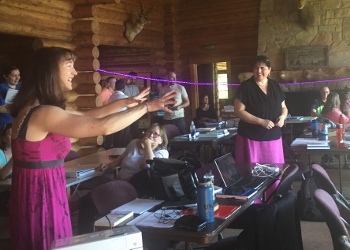LAMP Faculty Of The Month (November, 2017)
 Dr. Jacqueline J. Shinker is recognized as the November LAMP Faculty Fellow of the
Month. Dr. Shinker of the UW Geography Department attended the intensive summer institute
at AMK Research Center outside Jackson Hole, WY in June 2017. She and twenty-five
other teaching fellows gained instructional knowledge, while developing their teaching
philosophies and plans to enact it within their future classrooms. Professional development
continues throughout the academic year at monthly workshops where fellows receive
continued training, implementation support and will, in the spring, share their personal
experiences.
Dr. Jacqueline J. Shinker is recognized as the November LAMP Faculty Fellow of the
Month. Dr. Shinker of the UW Geography Department attended the intensive summer institute
at AMK Research Center outside Jackson Hole, WY in June 2017. She and twenty-five
other teaching fellows gained instructional knowledge, while developing their teaching
philosophies and plans to enact it within their future classrooms. Professional development
continues throughout the academic year at monthly workshops where fellows receive
continued training, implementation support and will, in the spring, share their personal
experiences.We would like to commend Dr. Shinker, or J.J., for her efforts in developing and implementing
a meaningful and engaging instructional plan. J.J.’s plan focused on the development
of a First Year Seminar (FYS) course: GEOL 1011, Surviving the Apocalypse: The Geography
of Natural Disasters. In addition to creating active learning exercises aligned with
her learning outcomes, J.J. interwove inclusional instruction throughout her course.
By asking students to carefully consider human vulnerability with each disaster and
contextualizing between developed and less developed nations, Dr. Shinker increases
students’ global awareness of environmental justice issues and existing inequities.
I observed this in action in J.J.’s class on October 16th and again on October 23rd.
On the 16th, despite being under-the-weather, J.J. warmly greeted her class, checked-in
on the week, before covering announcements and introducing: Tsunami Week. After a
mini-lecture on the 2011 Japanese tsunami and Fukushima disaster, students worked
in groups to create maps of the event, focusing on representing one or more of the
overarching class concepts of mitigation, protection and adaptation through spatial
and temporal perspectives. While students struggled at first with the freedom to choose
how to make their maps, the allowed student choice inevitability enhanced student
appreciation and ownership over the mapping project. This shared class responsibility
requires instructors give up some authority, which is difficult to do, but worth supporting
students in taking control over their learning.

Utilizing teams is another way Dr. Shinker improves student accountability. Students
sit in groups during class, often working together on activities. Additionally, students
work together to give weekly ‘Hazard Team Reports from the Field’, joining one of
six team topics: Tectonic, Weather & Climate, Disease, Fire, Hydrology and Technology.
Teams collaborate to update the class on current events related to their topic. Enhancing
responsibility further, students are expected to self- and peer-assess their field
report presentations based on clarity, content, speaking, images and sources.
Students were clearly excited and proud of their Hazard Team Reports from the Field,
inviting me to return to watch them the following week. Wow, am I glad I did! The
reports provided an unique opportunity to increase student understanding and awareness
of international connections. Of all the student updates, nineteen of twenty-five
were international events. Students were clearly becoming more aware and comfortable
with global geography, but also conscious of the distinct inequities that exist when
and preparing for surviving natural disasters around the globe. What a great way to
support global literacy development! Dr. Shinker echoes this support on campus as
acting advisor of the Multicultural Association of Student Scientists (M.A.S.S.).
In addition to developing a new FYS course, J.J. continues to work to make her ‘Weather
and Climate’ class more active and meaningful. To this end, she supports independent
student research; one who is interested in measuring the effectiveness of using 3D-visualization
tools to support instruction in the weather and climate class. J.J., supported by
UW’s team at EIC's Shell 3D Visualization Center, created and used a ‘Vortex Simulator’
to help students understand and visualize weather maps. Commonly confusing for students,
3D visualization allows them the see, draw and interact with 3D maps, rather than
just a 2D image. She and her research student are piloting surveys this semester to
examine the impacts of using the 3D CAVE on student learning; J.J. noted excited that
her students performed better than previous years on the most current exam related
to the 3D topics. J.J. plans to continue investigating the impact of using 3D visualization
to support and enhance instruction.
Congratulation Dr. Shinker! Keep inspiring students and supporting educational research!
-Kali Nicholas Moon & Rachel Watson, 11/13/17

